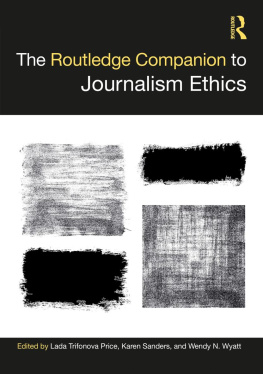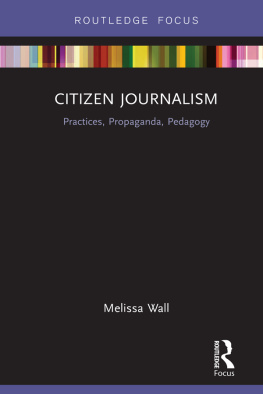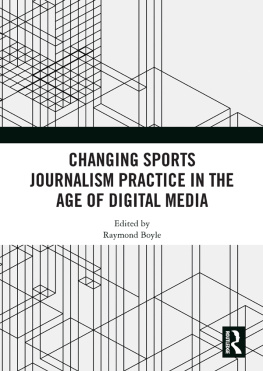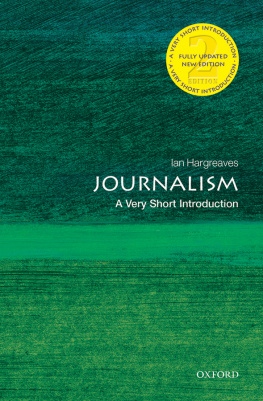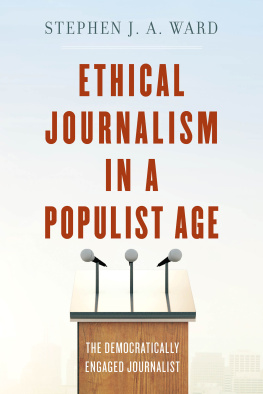THE ROUTLEDGE COMPANION TO JOURNALISM ETHICS
This volume provides a comprehensive discussion of enduring and emerging challenges to ethical journalism worldwide.
The collection highlights journalism practice that makes a positive contribution to peoples lives, investigates the link between institutional power and ethical practices in journalism, and explores the relationship between ethical standards and journalistic practice. Chapters in the volume represent three key commitments: (1) ensuring practice informed by theory, (2) providing professional guidance to journalists, and (3) offering an expanded worldview that examines journalism ethics beyond traditional boundaries and borders. With input from over 60 expert contributors, it offers a global perspective on journalism ethics and embraces ideas from well-known and emerging journalism scholars and practitioners from around the world.
The Routledge Companion to Journalism Ethics serves as a one-stop shop for journalism ethics scholars and students as well as industry practitioners and experts.
Lada Trifonova Price is a senior journalism lecturer in the Department of Media, Arts, and Communication at Sheffield Hallam University in the UK. She is a former journalist, and her current research focuses on media and journalistic practice in transitional democracies. She is a co-director of education at the Centre for Freedom of the Media, one of the leading non-profit organizations in the field of journalism safety. Some recent publications include original research articles on media corruption, chapters on impact of media censorship and self-censorship on journalism in post-communist countries, and analyses of the effects of democratization on the media landscape of Bulgaria and Romania.
Karen Sanders is a professor of communication and politics at St Marys University (London, UK). She has published widely on ethics, identity, and public communication and is the author of key texts such as Ethics and Journalism (2003) and Communicating Politics in the 21st Century (2008). She is a founding member of the journal Ethical Space and of the Association of Political Communication (ACOP). Previously a professor in Madrid and at Sheffield University, she lived for a time in Peru, resulting in the publication of an account of the intellectual foundations of the modern Peruvian state. Sanders has a special interest in understanding and fostering respectful communication in high-risk organizations.
Wendy N. Wyatt is the vice provost for academic affairs and a professor of media ethics at the University of St. Thomas-Minnesota in the US. Her research focuses on issues of media and democracy, and she has particular interests in journalism ethics, citizen responsibilities to the media, and media literacy. Wyatt was part of the five-person editorial team that guided development of the Online News Associations Build Your Own Ethics Code platform.
First published 2022
by Routledge
2 Park Square, Milton Park, Abingdon, Oxon OX14 4RN
and by Routledge
605 Third Avenue, New York, NY 10158
Routledge is an imprint of the Taylor & Francis Group, an informa business
2022 selection and editorial matter, Lada Trifonova Price, Karen Sanders,
and Wendy N. Wyatt; individual chapters, the contributors
The right of Lada Trifonova Price, Karen Sanders, and Wendy N. Wyatt
to be identified as the authors of the editorial material, and of the authors
for their individual chapters, has been asserted in accordance with
sections 77 and 78 of the Copyright, Designs and Patents Act 1988.
All rights reserved. No part of this book may be reprinted or reproduced
or utilised in any form or by any electronic, mechanical, or other
means, now known or hereafter invented, including photocopying and
recording, or in any information storage or retrieval system, without
permission in writing from the publishers.
Trademark notice: Product or corporate names may be trademarks
or registered trademarks, and are used only for identification and
explanation without intent to infringe.
British Library Cataloguing-in-Publication Data
A catalogue record for this book is available from the British Library
Library of Congress Cataloging-in-Publication Data
Names: Price, Lada T. (Lada Trifonova), editor. | Sanders, Karen,
1961 editor. | Wyatt, Wendy N., editor.
Title: The Routledge companion to journalism ethics / edited by
Lada T. Price, Karen Sanders, and Wendy N. Wyatt.
Description: London; New York: Routledge, 2021. | Includes
bibliographical references and index. | Identifiers: LCCN 2021005027 |
ISBN 9780367206475 (hardback) | ISBN 9781032041599 (paperback) |
ISBN 9780429262708 (ebook)
Subjects: LCSH: Journalistic ethics.
Classification: LCC PN4756 .R677 2021 | DDC 174/.907dc23
LC record available at https://lccn.loc.gov/2021005027
ISBN: 9780367206475 (hbk)
ISBN: 9781032041599 (pbk)
ISBN: 9780429262708 (ebk)
Typeset in Bembo
by codeMantra
Karen Sanders
Introduction
As deaths from COVID-19 steadily grew across Europe in March 2020, governments locked down their populations, in many countries permitting work-related travel only for those classified as key workers; in Spain and Britain, these included journalists reporting on the pandemic. The spread of COVID-19 put center stage the critical importance of the provision of reliable information and of stories told in words and pictures about the victims, villains, and heroes of the pandemic. These stories shamed some who flouted instructions to observe social distancing and honored others who risked their lives doing their jobs. They showed the vital work journalists do, albeit often imperfectly, to let us know about the reality of our daily experience and the directions in which truth and falsity lie.
This chapter argues for an approach to journalism ethics that foregrounds the centrality of truth-seeking practices, serving each person and the larger human community, and that cultivates values and virtues such as honesty, justice, and compassion. It can be argued that these practices and virtues are constitutive of journalism itself; without them the occupational practice becomes something else: propaganda, public relations, or show business. Journalism without ethics, in other words, is no longer journalism.
I first examine the subject of ethics itself, taking human action as its subject matter and recognizing that our judgments of it derive from the platforms of understanding constituted by variables such as gender, age, faith, education, and ethnic origin. Sweeping cultural, technological, and social changes have made us more alert to the imbalances in power and resources that have privileged certain ethical accounts over others. As fellow authors recount in this volume (). Nevertheless, I argue that one shared language (there may be others) that allows us to characterize and describe ethics in a way that makes conversation between us meaningful can be found in the virtue ethics tradition. I take it to be the ground upon which an ethics for journalism can stand in its emphasis on human agency and flourishing, truth-seeking and truth-telling, and orientation to the common good.
Second, I address a fundamental issue posed for journalism ethics, placed into sharp focus by the digital transformation of news and information curation and dissemination (see Van Dijck, Poell & de Waal, 2018). The institutional ethos of journalism advocated by liberal pluralists (see below) has been that of a journalism characterized by truth-seeking, free speech at the service of the public, and democratic values. However, this has long been seen by critical political economists as incompatible with the market business model within which journalists must largely work. For these scholars, media institutions, far from speaking truth to power, speak the truths of the powerful and ill serve the powerless because of the political economy by which they are structured (see Herman & Chomsky, 2010). The evident crisis of the news business model also underscores the increasingly problematic status of journalism as a practice that can serve the political ethos of democratic states (see Pickard, 2020), already undermined by citizens loss of trust in mainstream political leaders. Part of the remedy for this, I finally argue, lies in nourishing and teaching the values and virtues that constitute journalism through ambitious educational programs for all of us.

